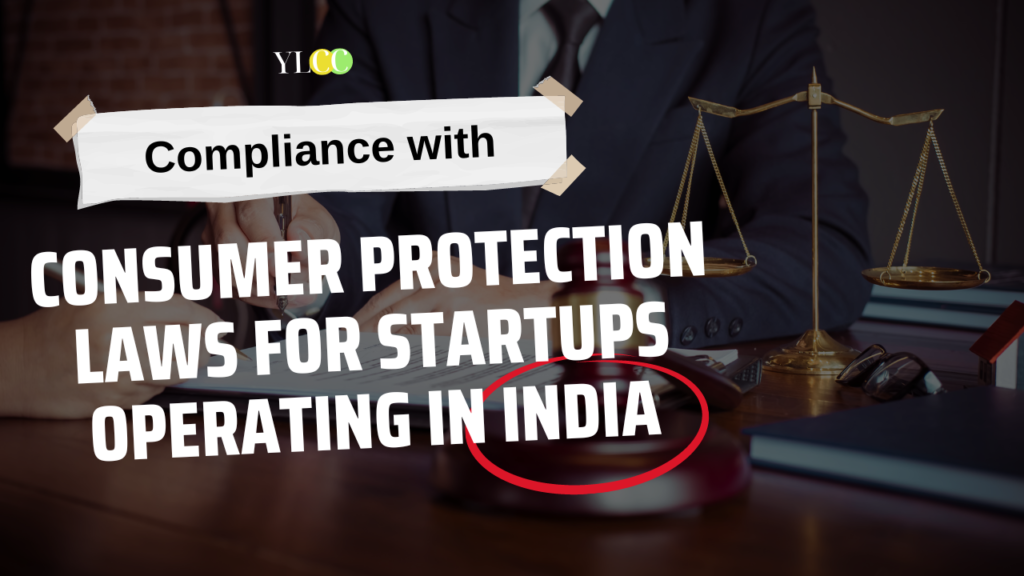
Stay Compliant, Stay Confident
Are you planning to join the exciting world of Indian startups? That’s great news! But before you dive headfirst into the world of business, you need to make sure that you’re complying with consumer protection laws. In today’s world, consumers are smarter than ever, and they demand nothing less than fair and ethical treatment. That’s why in this article, we’re going to talk about the various consumer protection laws that startups in India need to follow, so you can pop into the world of business like a pro, without any legal trouble. So, let’s get started!
Know Your Laws: Why Startups in India Need to Follow Consumer Protection Regulations and More!
To start off, the Consumer Protection Act, 2019 is the boss law governing consumer protection in India. It replaced the old 1986 version and created the Central Consumer Protection Authority (CCPA) to safeguard the rights of consumers. The CCPA is a powerhouse with the authority to investigate, prosecute, and slap penalties on businesses that flout consumer protection laws.
But wait, there’s more! Startups in India also need to be familiar with other laws to ensure they are complying with consumer protection regulations. These include the Sale of Goods Act, 1930, which deals with the sale of goods and warranties implied in contracts. There’s also the Indian Contract Act, 1872, which outlines remedies in case of a breach of contract.
And we can’t forget about the Food Safety and Standards Act, 2006, which governs food safety and standards and imposes penalties for violations. The Legal Metrology Act, 2009, is another one to keep in mind, as it governs the use of weights and measures in trade and commerce, and again, imposes penalties for violations.
Lastly, the Information Technology Act, 2000, regulates electronic commerce and imposes penalties for violations. So, startups, buckle up and get ready to stay compliant with all these consumer protection laws!
Consumer Rights and Protections
Startups operating in India need to be aware of the various consumer rights and protections that are provided for under Indian law. These include:
- The Right to Safety: Consumers have the right to be kept safe from goods and services that could be harmful to their health or safety. No one wants to buy a ticking time bomb!
- The Right to Information: Consumers have the right to know all the details about what they’re buying – how much, how good, how potent, how pure, and how much it costs. No shady business here!
- The Right to Choice: Consumers have the right to choose from a variety of goods and services at competitive prices. Who doesn’t love a good deal?
- The Right to Redressal: Consumers have the right to seek justice if they’ve been treated unfairly or if they’ve purchased a defective product or service. It’s time to stand up for yourself!
- The Right to Consumer Education: Consumers have the right to be educated about their rights and responsibilities. Knowledge is power, baby!
Compliance Checklist for Startups
If you’re operating in this land of spices and startups, then you better be aware of the consumer protection laws that govern your business. Non-compliance with these laws can lead to legal and financial troubles, and nobody wants that, right? So, to help you stay on the right side of the law, we’ve come up with a comprehensive compliance checklist that covers all the essential aspects of consumer protection laws. Buckle up and get ready to tick off those boxes, folks!
Register with the CCPA
The Consumer Protection Act, 2019, mandates the establishment of the Central Consumer Protection Authority (CCPA) to promote, protect, and enforce the rights of consumers. Startups operating in India should register with the CCPA to ensure compliance with consumer protection laws. The registration process is simple and can be completed online through the official website of the CCPA.
Appoint a Grievance Redressal Officer
Startups should appoint a Grievance Redressal Officer (GRO) to handle consumer complaints. The GRO should be easily accessible and responsive to consumer complaints. The contact details of the GRO should be prominently displayed on the startup’s website and mobile application. The GRO should address consumer complaints promptly and resolve them in a timely and satisfactory manner.
Provide Clear and Accurate Information
Startups should provide clear and accurate information about their products and services. This includes pricing, warranties, refund policies, and any other relevant information. The information provided should be easily accessible and understandable by consumers. Startups should avoid using misleading or deceptive information that may mislead consumers.
Ensure Product Safety
Startups should ensure that their products are safe for consumers to use and comply with relevant safety standards. They should conduct proper testing and quality control to ensure that their products meet safety standards. Startups should also provide clear instructions on the safe use of their products and issue recalls or warnings in case of safety concerns.
Comply with Weights and Measures Regulations
Startups should comply with weights and measures regulations and ensure that their products are accurately weighed and measured. This is particularly important for startups in the food and beverage industry, as inaccurate measurements can have health and safety implications for consumers. Startups should also ensure that their packaging meets the relevant regulations and standards.
Comply with Food Safety Regulations
Startups operating in the food and beverage industry should comply with food safety regulations and ensure that their products are safe for consumption. This includes proper handling, storage, and preparation of food products. Startups should also obtain the necessary licenses and permits required to operate in the food and beverage industry.
Comply with Information Technology Regulations
Startups should comply with information technology regulations and ensure that their websites and mobile applications comply with applicable laws. This includes compliance with data protection and privacy laws, as well as regulations related to e-commerce and online transactions. Startups should also provide clear terms and conditions of use and obtain the necessary consents from users for the collection and processing of their personal data.
How to Avoid a Legal Popcorn-pocalypse: A Gourmet Popcorn Shop Example of Compliance with Consumer Protection Laws in India
Imagine you’re starting a new business in India – let’s say it’s a gourmet popcorn shop called “Pop Til You Drop.” Congratulations! But before you get too caught up in the excitement, let’s take a moment to talk about something that’s not so glamorous: compliance with consumer protection laws.
Now, I know what you’re thinking – regulations aren’t exactly the most fun part of starting a business. But trust me, they’re important. Not only will complying with consumer protection laws keep you out of legal trouble, but it will also show your customers that you care about their well-being and are committed to operating your business ethically.
So, let’s go through a compliance checklist for Pop Til You Drop, shall we? First things first, you’ll need to register your business with the CCPA. It’s a simple process, and it will ensure that you’re operating legally from day one.
Next, you’ll want to appoint a Grievance Redressal Officer. This person will be your go-to for customer complaints and concerns, and they’ll work to make sure that everyone who visits your shop leaves happy and satisfied.
When it comes to selling your gourmet popcorn, it’s important to provide clear and accurate information about your products. This means being honest about pricing, ingredients, and any health claims you make. And speaking of health claims, make sure you have scientific evidence to back them up!
Of course, safety is also a top priority. You’ll want to ensure that your popcorn is safe for consumption and that your equipment is functioning properly. And if you sell your popcorn by weight, you’ll need to comply with weights and measures regulations to make sure your customers are getting what they paid for.
Last but not least, if you’re planning to sell your popcorn online, you’ll need to comply with information technology regulations. This means making sure your website and mobile app are secure and that you’re following all relevant data privacy laws.
I know that’s a lot to keep track of, but by following this compliance checklist, you’ll be well on your way to running a successful and legally sound business. And who knows – maybe one day you’ll be known as the “Popcorn King” of India. Good luck, and don’t forget to offer your customers a free bag of popcorn!
Conclusion
Compliance with consumer protection laws is essential for startups operating in India. Startups should follow a comprehensive compliance checklist that covers various aspects of consumer protection laws. This includes registering with the CCPA, appointing a GRO, providing clear and accurate information, ensuring product safety, complying with weights and measures regulations, complying with food safety regulations, and complying with information technology regulations. By following these guidelines, startups can build consumer trust and credibility and avoid legal and financial consequences of non-compliance.
This article has been written by Team YLCC. For any other queries, reach out to us at: queries.ylcc@gmail.com






